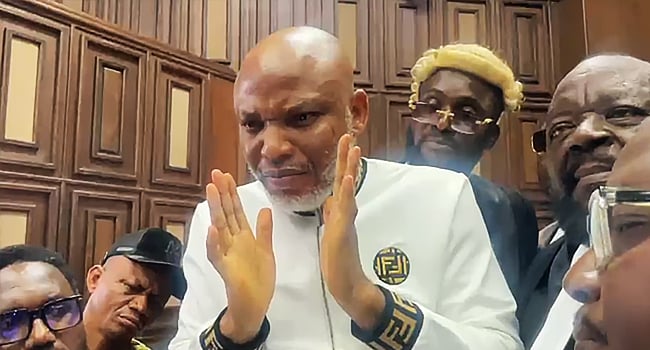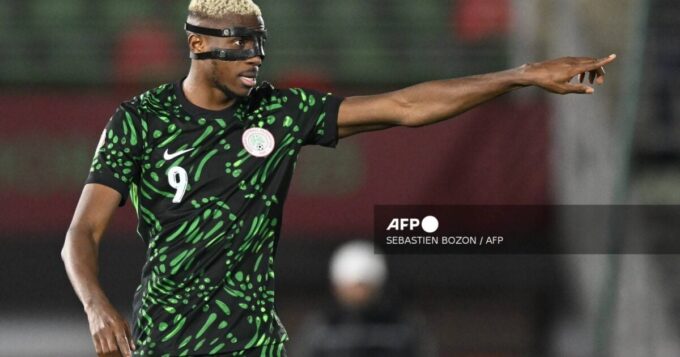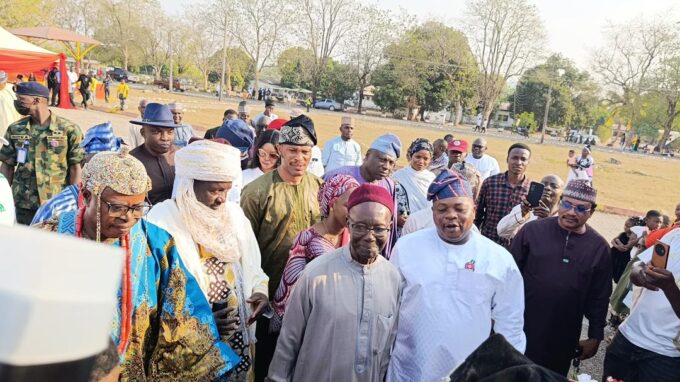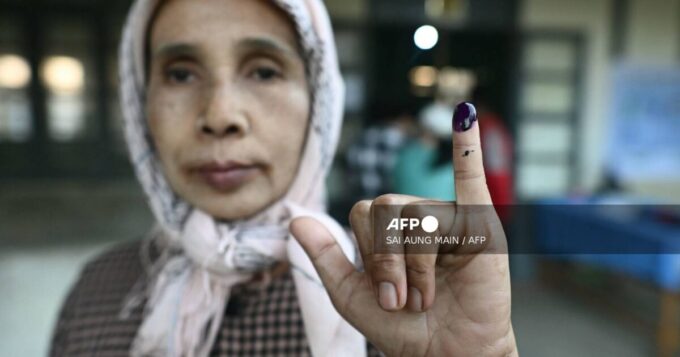
On a humid Thursday morning in Abuja, the atmosphere inside the Federal High Court was unusually tense.
Security operatives from the Department of State Services and the courtroom security, alongside lawyers, journalists, and a few friends and family of the defendant, were present in the courtroom.
In the witness box, the leader of the proscribed Indigenous People of Biafra, Nnamdi Kanu, was standing, awaiting the court’s decision regarding the 10-year-long trial on terrorism-related charges preferred against him by the Federal Government.
As soon as the judge made his entrance and sat on his chair, Kanu yelled, “There is no judgment here today. There is not going to be judgment here.”
The trial judge, Justice James Omotosho, however, responded by calling for decorum. He asked Kanu to wait for the case to be called before making any arguments.
After the case was called, Justice Omotosho addressed applications filed before the court and delivered a ruling dismissing three fresh motions filed by Kanu on the ground that they were unmeritorious.
After delivering the ruling, Justice Omotosho declared readiness to proceed with the judgment.
However, Kanu interjected, insisting that the court could not continue because he had not filed his final written address.
The defendant suddenly erupted in anger, charged at the trial judge, and accused him of being biased and not knowing the law, among other utterances.
Kanu said, “Which law states that you can charge me on a repealed law? Show me. Omotosho, where is the law? Show me the clause in the Constitution that says so. Show me, but you can’t show me, and you claim to be a judge. Any judgment declared in this court is complete rubbish! You don’t know the law.”
At this point, the court froze, and surprise was registered on the faces of the journalists who looked up from their notepads.
The trial judge momentarily paused.
Kanu’s rage did not allow the proceedings to continue as he would not let the judge speak.
Of course, the judge could not engage in a shouting match with him, so the court rose, and Justice Omotosho went into his chamber.
Upon his return to the courtroom after about 20 minutes, the prosecution prayed the court to deliver the judgment in the absence of the defendant, citing his misconduct in the temple of justice.
While Justice Omotosho noted that it was the constitutional right of a defendant for trial to be conducted in his or her presence, he, however, noted that in a situation where the defendant misconducted himself or acted in an unruly manner during the course of the trial, the trial could be conducted in the defendant’s absence.
He proceeded to order that Kanu be taken out of the courtroom for the rest of the proceedings.
“I hereby make an order because of the unruliness of the defendant. I hereby declare that the judgment and other proceedings be made in his absence,” he said.
After the order was given, as the operatives attempted to lead Kanu out of the courtroom, he barked at them, “Don’t touch me, don’t touch me!”
Pushing their hands away and further threatening, “If you touch me!”
Scenes like this, once unthinkable in Nigeria’s traditionally solemn courtrooms, are becoming increasingly common.
From the outbursts of IPOB leader Nnamdi Kanu, to the theatrics of high-profile politicians, to lesser-known suspects defiantly resisting their arraignment, courtroom misbehaviour is turning trials into public spectacles, raising questions about legal order, state power, mental strain, and the evolving nature of justice in the media age.
This is a deep dive into the trend, rich with examples. In the past, Kanu has had similar outbursts in the court of Justice Binta Nyako.
He yelled and demanded her recusal, stating that he had lost faith in her as a presiding judge over his matter and that he should be assigned another one. He shoved and pushed security operatives, slapped his counsel to keep quiet and not speak while he was speaking, among other actions.
Even in October, Kanu shouted over the judge, repeatedly refusing to take his plea. At one point, he attempted to walk out of the dock until armed officials physically returned him.
Court insiders say the outburst may have been calculated to delay proceedings, create sympathy narratives online, or challenge the legitimacy of the charges.
Kanu’s court appearances have repeatedly attracted controversy. His refusal to appear properly in court, clashes between security personnel and his supporters, and his public disagreements with legal procedures have contributed to one of the most dramatic courtroom sagas in Nigeria.
In several instances, judges warned him and his supporters for disruptions ranging from chants outside the courtroom to verbal protests inside it.
It is not only high-profile defendants who exhibit these unruly tendencies. Magistrate courts in Lagos, Port Harcourt, and Kano have also reported cases of defendants fighting police officers during arraignments; individuals spitting on magistrates; suspects stripping themselves in protest; and family members charging at court officials.
A particular case from a Lagos magistrate court showed a robbery suspect screaming and rolling on the floor, shouting, “They forced me to confess!” as proceedings struggled to continue.
Legal psychologists and criminologists identify several overlapping factors contributing to this trend. They point to high emotional pressure, tactical disruption, mental health strain, and media-driven behaviour.
Nigeria is not alone. Courtroom misbehaviour is a global phenomenon, even though the context differs.
In Chicago, United States of America, a murder suspect in 2021 had to be gagged and cuffed after repeatedly insulting the judge.
In Florida, a defendant physically attacked his attorney during trial, prompting enhanced security nationwide.
In South Africa, the Marikana trial was disrupted by family protests, shouting bouts, and walkouts during several hearings connected to the killings.
In the United Kingdom, the “No-Law Movement” defendants, also known as “sovereign citizens,” disrupted hearings by refusing to recognise court authority and shouting scripted arguments.
During the trials of Alexei Navalny in Russia, defendants and supporters regularly staged gestures of defiance inside courtrooms to attract international media attention.
Nigeria, experts say, is experiencing its own version, shaped by politics, public distrust, and a highly charged information ecosystem.
As Nigeria’s politics intensify, economies strain, and social distrust deepens, the courtroom has become not just a legal arena, but a stage.
A stage where defendants attempt to sway public narratives, challenge authority, or simply release pent-up frustration.
For judges and attorneys, the challenge is maintaining dignity and order. For society, it is understanding that justice requires calm, something increasingly rare inside Nigeria’s courtrooms.
Yet, despite the theatrics, one truth remains: the courtroom must never become a battleground.
As stressed by Justice Omotosho, the court is a temple of Justice. Institutions must be respected.
Some Senior Advocates, speaking on defendants becoming unruly during trial, stated that it is contempt of court, adding that in the case of Kanu on Thursday, the judge acted within the law.
Lekan Ojo (SAN) said Kanu’s conduct was a valid ground in law to exclude him from the courtroom during proceedings.
“The unruly behaviour of the defendant… where a defendant in a criminal case behaves in an unruly manner, that has always been a valid reason to dispense with his presence,” Ojo said.
He explained that the Administration of Criminal Justice Act 2015 permits trial in absentia in exceptional circumstances, noting that Justice Omotosho acted within the law.
Another senior lawyer, Adedayo Adedeji (SAN), described Kanu’s actions as contempt in the face of the court.
“No matter the reservations you have about the proceedings or the judge, there is a lawful procedure to follow. Not coming out, insulting the judge, or insulting the court… that’s contempt,” he said.
Adedeji praised the judge for handling the situation with maturity. “He is the master of his court… and acted within his inherent powers,” he added, warning that justice must be done not only for the defendant, but for the state and the public.
Kunle Adegoke (SAN) said defendants sometimes act unruly to win public sympathy, stressing that such conduct ultimately works against them.
“The one that happened yesterday has been quite unfortunate… it has been the attitude of the defendant to be unruly in court, and that does not promote his interest,” he said.
Adegoke dismissed suggestions of mental instability, adding that Kanu’s behaviour was a continuation of what he described as “outrageous, unguarded, and unruly” conduct.
Also commenting, Simon Lough (SAN) attributed Kanu’s outburst to frustration, arguing that the delays in the case resulted largely from multiple applications filed by his legal team.
“He feels frustrated… but those delays were caused by his lawyers,” Lough said.
He noted that many Nigerians were unaware of the scale of the offences alleged against Kanu, which, according to him, included the killing of 128 police officers, the destruction of 180 police stations, and the theft of thousands of arms and ammunition.
“So, his outburst was unnecessary… you don’t misbehave in court. The court is a sacred place,” Lough said, commending the judge for acting as an “unbiased umpire.”
Justice Omotosho went on to convict Kanu on all terrorism-related charges and sentenced him to life imprisonment. The court ordered that he be removed from the courtroom while judgment was being delivered after he repeatedly shouted at the judge and disrupted proceedings.
The senior lawyers agreed that the judge showed restraint and acted within his constitutional and statutory powers.


















Leave a comment